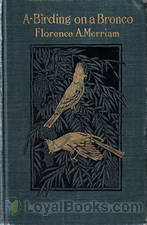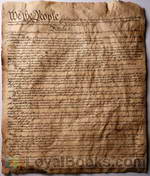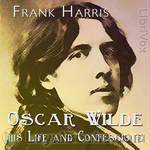|
Books Should Be Free Loyal Books Free Public Domain Audiobooks & eBook Downloads |
|
|
Books Should Be Free Loyal Books Free Public Domain Audiobooks & eBook Downloads |
|
Non-fiction |
|---|
|
Book type:
Sort by:
View by:
|
By: Flavius Josephus (37 - c.100) | |
|---|---|
 The Antiquities of the Jews
The Antiquities of the Jews
Antiquities of the Jews was a work published by the important Jewish historian Flavius Josephus about the year 93 or 94. It is a history of the Jewish people, written in Greek for Josephus' gentile patrons. Beginning with the creation of Adam and Eve, it follows the events of the historical books of the Hebrew Bible, but sometimes omits or adds information.Volume 1 contains Books 1-5 and ends with the dedication of Samuel and death of Eli the priest. | |
 Minor Works of Josephus
Minor Works of Josephus
There are 3 parts to this collection.(1) Against Apion is a two-volume defense of Judaism as classical religion and philosophy, stressing its antiquity, as opposed to what Josephus claimed was the relatively more recent tradition of the Greeks. Some anti-Judean allegations ascribed by Josephus to the Greek writer Apion, and myths accredited to Manetho are also addressed.(2) Discourse To The Greeks Concerning Hades describes the author's views on the afterlife against the prevailing view of the "Greeks" (i... | |
By: Fletcher Manufacturing Company | |
|---|---|
 The Candy Maker's Guide A Collection of Choice Recipes for Sugar Boiling
The Candy Maker's Guide A Collection of Choice Recipes for Sugar Boiling
| |
By: Florence A. Merriam (1863-1948) | |
|---|---|
 A-Birding on a Bronco
A-Birding on a Bronco
Florence Augusta Merriam Bailey (August 8, 1863 - September 22, 1948) was an American ornithologist and nature writer. She started observing bird behavior at a time when most bird study was based on collections and skins. By 1885, she began to write articles focusing on protecting birds. Her introduction of a birdwatching field guide, aimed at living birds, is considered the first in the tradition of modern bird guides. She wrote the first of these at the age of 26, initially as a series of notes in the Audubon Magazine and later as books. In "A-Birding on a Bronco," she writes an engaging memoir about her several trips to study birds on a ranch in California in the late 1800's. | |
By: Florence Converse (1871-1967) | |
|---|---|
 The Story of Wellesley
The Story of Wellesley
| |
By: Florence Daniel | |
|---|---|
 The Healthy Life Cook Book, 2d ed.
The Healthy Life Cook Book, 2d ed.
| |
By: Florence Hartley | |
|---|---|
 Ladies' Book of Etiquette, and Manual of Politeness
Ladies' Book of Etiquette, and Manual of Politeness
A guide for ladies, written in 1860, on what is accepted as correct behavior in polite society. The advice covers dress, travelling, staying in hotels, attending and giving parties and balls, making and receiving morning calls, letter writing, how to deal with servants, what accomplishments every well bred lady should be expected to acquire and how to choose a suitable husband. | |
By: Florence Kreisler Greenbaum | |
|---|---|
 The International Jewish Cook Book 1600 Recipes According to the Jewish Dietary Laws
The International Jewish Cook Book 1600 Recipes According to the Jewish Dietary Laws
| |
By: Florence Nightingale (1820-1910) | |
|---|---|
 Notes on Nursing
Notes on Nursing
Notes on Nursing was published in 1859 and is a fascinating view into the theories underpinning the early development of modern nursing and public health reform by "the Lady with the Lamp", Florence Nightingale. Emphasising common sense and thought for the patient's care in many more ways than just administering physician-prescribed medicines, this is still a very relevant book for those interested in health or caring for the sick and infirm today.Summary by Cori Samuel. | |
By: Founding Fathers of the United States | |
|---|---|
 The Constitution of the United States of America, 1787
The Constitution of the United States of America, 1787
The Declaration of Independence was signed on July 4, 1776. It announced that the thirteen American colonies, who were at war with Great Britain in the American Revolutionary War, no longer considered themselves part of the British Empire. They now called themselves a new nation, The United States of America. This famous document went on to become a well-known keystone of the human rights movement. However, the newly formed state had no real identity or philosophy and were merely a loose collection of states that had freed themselves from colonial rule... | |
 The Declaration of Independence of the United States of America
The Declaration of Independence of the United States of America
Declaration of Independence is the document in which the Thirteen Colonies declared themselves independent of the Kingdom of Great Britain and explained their justifications for doing so. It was ratified by the Continental Congress on July 4, 1776. | |
By: Frances Alice Forbes (1869-1936) | |
|---|---|
 Saint Athanasius: The Father of Orthodoxy
Saint Athanasius: The Father of Orthodoxy
A short and rather old fashioned biography a great saint. Don't expect subtlety; it's unapologetic hagiography. The saint is presented as a figure of pristine brilliance, courage and integrity and his persecutors as conniving villains. But to those who appreciate what was at stake in the controversy, Athanasius is indeed a God-sent hero. This is an informative, if quaint, introduction to a fascinating figure in history. | |
By: Frances Anne Kemble (1809-1893) | |
|---|---|
 Journal of A Residence On A Georgian Plantation, 1838-1839
Journal of A Residence On A Georgian Plantation, 1838-1839
Fanny Kemble was a British actress who married mega-plantation owner, Pierce Butler of Georgia. During her marriage she kept journals of everyday life, and after some years grew to detest the institution of slavery and the things Butler stood for. Kemble eventually divorced him, but it wasn't until after the Civil War had started that she published her journal about her observations and the experiences of the hundreds of African American slaves owned by her ex-husband. | |
By: Frances Calderón de la Barca (1804-1882) | |
|---|---|
 Life in Mexico
Life in Mexico
FRANCES CALDERON DE LA BARCA, born in Edinburgh, 1804, the daughter of William Inglis. After her father’s death she settled in America, where she married the Spanish diplomat, Don Angel Calderon de la Barca. She accompanied him on his various appointments to Mexico, Washington, and finally to Madrid, where she was created Marquesa de Calderon de la Barca by Alfonso XII and died in 1882. The present work is the result of observations made during a two years’ residence in Mexico, by a lady, whose position there made her intimately acquainted with its society, and opened to her the best sources of information in regard to whatever could interest an enlightened foreigner... | |
By: Frances M. A. Roe | |
|---|---|
 Army Letters from an Officer's Wife, 1871-1888
Army Letters from an Officer's Wife, 1871-1888
"There appeared from the bushes in front of me, and right in the path, two immense gray wolves . . . Rollo saw them and stopped instantly, giving deep sighs, preparing to snort, I knew . . . To give myself courage, I talked to the horse, slowly turning him around . . . when out of the bushes in front of us, there came a third wolf! The situation was not pleasant and without stopping to think, I said ‘Rollo, we must run him down - now do your best’ and taking a firm hold of the bridle, and bracing myself in the saddle, I struck the horse with my whip and gave an awful scream... | |
By: Francis B. (Francis Bail) Pearson (1853-) | |
|---|---|
 Reveries of a Schoolmaster
Reveries of a Schoolmaster
| |
 The Reconstructed School
The Reconstructed School
| |
 The Vitalized School
The Vitalized School
| |
By: Francis Bacon (1561-1626) | |
|---|---|
 The Essays of Francis Bacon
The Essays of Francis Bacon
Among the many ideas explored in this book are beauty, gardens, honor and reputation, cunning, nobility, friendship and many others. Authored by the man who is credited with having invented the essay form in English, The Essays of Francis Bacon was written over an extended period, ranging from the mid sixteenth century. They were compiled in a single edition in 1597 and later re-written, enlarged and added to in other editions in 1612 and 1625. However, their compelling and insightful quality still appears fresh and appealing to modern day readers... | |
 The New Atlantis
The New Atlantis
In 1623, Francis Bacon expressed his aspirations and ideas in New Atlantis. Released in 1627, this was his creation of an ideal land where people were kind, knowledgeable, and civic-minded. Part of this new land was his perfect college, a vision for our modern research universities. Islands he had visited may have served as models for his ideas. | |
By: Francis Ellingwood Abbot (1836-1903) | |
|---|---|
 A Public Appeal for Redress to the Corporation and Overseers of Harvard University Professor Royce's Libel
A Public Appeal for Redress to the Corporation and Overseers of Harvard University Professor Royce's Libel
| |
By: Francis Leggett | |
|---|---|
 Tea Leaves
Tea Leaves
| |
By: Francis P. Obrien | |
|---|---|
 The High School Failures A Study of the School Records of Pupils Failing in Academic or Commercial High School Subjects
The High School Failures A Study of the School Records of Pupils Failing in Academic or Commercial High School Subjects
| |
By: Francis Parkman | |
|---|---|
 Pioneers of France in the New World
Pioneers of France in the New World
Francis Parkman (1823-1893) has been hailed as one of America’s first great historians and as a master of narrative history. Numerous translations have spread the books around the world. The American writer and literary critic Edmund Wilson (1895-1972) in his book O Canada (1965), described Parkman’s France and England in North America in these terms: The clarity, the momentum and the color of the first volumes of Parkman’s narrative are among the most brilliant achievements of the writing of history as an art... | |
 The Jesuits in North America in the 17th Century
The Jesuits in North America in the 17th Century
Parkman has been hailed as one of America's first great historians and as a master of narrative history. Numerous translations have spread the books around the world. The American writer and literary critic Edmund Wilson (1895-1972) in his book "O Canada" (1965), described Parkman’s France and England in North America in these terms: "The clarity, the momentum and the color of the first volumes of Parkman’s narrative are among the most brilliant achievements of the writing of history as an art... | |
By: Francis Rolt-Wheeler | |
|---|---|
 The Boy With the U.S. Census
The Boy With the U.S. Census
THE BOY WITH THE U.S. CENSUSBY FRANCIS ROLT-WHEELERPREFACELife in America to-day is adventurous and thrilling to the core. Border warfare of the most primitive type still is waged in mountain fastnesses, the darkest pages in the annals of crime now are being written, piracy has but changed its scene of operations from the sea to the land, smugglers ply a busy trade, and from their factory prisons a hundred thousand children cry aloud for rescue. The flame of Crusade sweeps over the land and the call for volunteers is abroad... | |
By: Francis Wellman (1854-1942) | |
|---|---|
 Art of Cross-Examination
Art of Cross-Examination
A classic text on cross-examination of witnesses, including many examples of techniques used in celebrated cases by such notable attorneys as Abraham Lincoln and future Supreme Court Justice Benjamin Cardozo. Wellman sprinkles the text liberally with background facts and explanations of the cases and just plain gossip about the participants. Useful listening for anyone who occasionally feels the need to dig a bit deeper for the truth in any conversation. - Summary by Joanne Turner | |
By: François-René de Chateaubriand (1768-1848) | |
|---|---|
 Memoirs of Chateaubriand Volume IV
Memoirs of Chateaubriand Volume IV
After the extinction of Napoleon's comet on St Helena, Chateaubriand covers the Bourbon Restoration in this volume, meeting a dazzling array of literary and political figures, as his diplomatic career advances. - Summary by Nicole Lee | |
By: Frank Albert Waugh (1869-1943) | |
|---|---|
 Dwarf Fruit Trees
Dwarf Fruit Trees
This book is a handbook for the home orchardist. The propagation, pruning, choice of variety, and management of dwarf fruit trees, specifically apples, pears, peaches, and plums, are outlined. In addition, there is a section on berry bushes. It is geared towards gardeners in the United States of America and Canada. - Summary by A. Gramour | |
By: Frank Allaben (1867-1927) | |
|---|---|
 Concerning Genealogies
Concerning Genealogies
Written over a century ago, this comprehensive book offers insight into the methods used to research and compile a family history. As stated in the preface of the book, "Strong emphasis is laid upon the importance of employing the historical method..." which is sorely lacking in today's computerized compilations. - Summary by Roger Melin | |
By: Frank Bertram Wade (1875-) | |
|---|---|
 A Text-Book of Precious Stones for Jewelers and the Gem-Loving Public
A Text-Book of Precious Stones for Jewelers and the Gem-Loving Public
| |
By: Frank Harris | |
|---|---|
 Oscar Wilde: His Life and Confessions
Oscar Wilde: His Life and Confessions
Consumers of biography are familiar with the division between memoirs of the living or recently dead written by those who “knew” the subject more or less intimately, and the more objective or scholarly accounts produced by later generations.In the case of Wilde, as presented to us by Frank Harris, we are in a way doubly estranged from the subject. We meet with Oscar the charismatic talker, whose tone of voice can never be reproduced – even if a more scrupulous biographer had set down his words accurately – and we are perhaps already aware of him as Wilde the self-destructive celebrity who uneasily fills the place of the premier gay icon and martyr in our contemporary view... | |